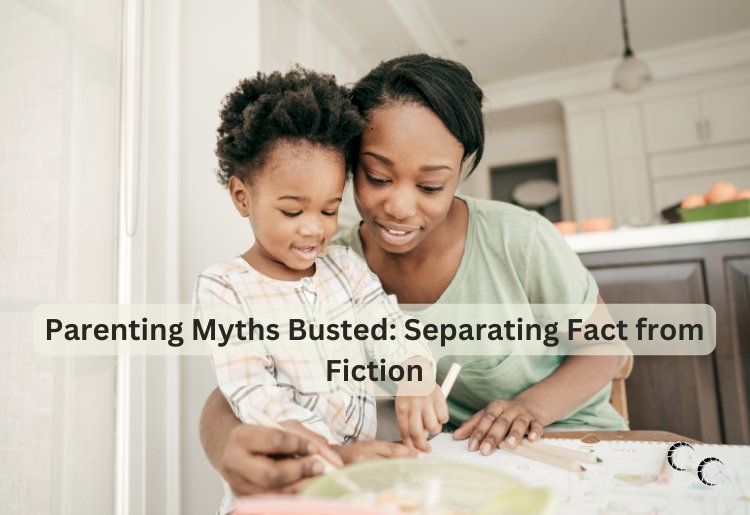Parenting Myths Busted: Separating Fact from Fiction

Parenting advice is everywhere—on social media, in books, at playdates, and in conversations with friends and family. But not all parenting myths are based on solid evidence. Some have been passed down through generations, while others are just popular misconceptions. It’s time to bust these myths and help you separate fact from fiction so that you can confidently navigate the challenges of raising children.
Myth 1: “Children should always be seen and not heard.”
This age-old saying, often tied to outdated parenting practices, suggests that children should remain quiet and obedient, especially in the presence of adults. However, modern parenting embraces the idea that children’s voices matter and that open communication helps build self-esteem, emotional intelligence, and problem-solving skills.
-
Fact: Children need to express themselves in a healthy way to develop good communication skills. Encouraging your child to share their thoughts and feelings fosters a strong emotional connection and promotes positive behavior.
Myth 2: “Good parents never let their kids cry.”
The idea that a "good parent" should immediately attend to their child’s every cry comes from the belief that crying indicates a failure to meet a child’s needs. This belief can lead to overprotectiveness and stress for parents, thinking they must intervene at every moment.
-
Fact: Crying is a natural part of childhood development. Sometimes, children need to cry as a way of expressing emotions, working through frustration, or learning to self-soothe. Responsiveness to crying is important, but not all tears require immediate intervention.
Myth 3: “Spanking is an effective form of discipline.”
Many parents believe that spanking or corporal punishment is an effective way to discipline their children. However, research shows that this practice can have long-term negative effects, including increased aggression, antisocial behavior, and strained parent-child relationships.
-
Fact: Positive discipline techniques, such as setting clear boundaries, using time-outs, or offering natural consequences, are much more effective in teaching children about appropriate behavior. Fostering open dialogue and setting consistent rules helps children learn self-regulation without the need for physical punishment.
Myth 4: “Raising a child is instinctive—parents should just know what to do.”
There’s a common belief that parenting should come naturally, but in reality, it often takes time, trial and error, and learning from mistakes. Every child is different, and what works for one child might not work for another.
-
Fact: Parenting is a learned skill. It's okay to make mistakes and learn as you go. Seeking out support from others, reading books on child development, or even attending parenting classes can help you build the knowledge and skills you need to be the best parent for your child.
Myth 5: “Children should never be given choices, or they’ll become spoiled.”
The myth that children will become spoiled if they’re allowed to make decisions for themselves leads to a more authoritarian approach to parenting. The idea is that children should always comply without question and follow adult directives.
-
Fact: Giving children age-appropriate choices helps them develop autonomy, decision-making skills, and a sense of responsibility. For example, allowing your child to pick out their clothes or choose between two snacks empowers them and fosters independence while maintaining parental control over boundaries.
Myth 6: “Parenting is harder for single parents.”
While it’s true that single parents face unique challenges, it’s a myth to say that parenting is inherently harder for single parents than for couples. Parenting is difficult for everyone, and many single parents thrive with the right support system and a balanced approach to their responsibilities.
-
Fact: Being a single parent may involve more logistical planning and juggling responsibilities, but it doesn’t make the act of parenting inherently harder. Single parents often develop strong bonds with their children and can be just as successful in raising well-adjusted kids as parents in two-parent households.
Myth 7: “Screen time will ruin your child’s brain.”
In the age of technology, parents often feel pressured to strictly monitor or limit their child’s screen time, fearing that it will have negative effects on development. However, the reality is more nuanced.
-
Fact: Not all screen time is bad, and the effects depend on how it’s used. Educational content, like interactive apps or learning videos, can be beneficial, while excessive passive screen time (like hours of watching TV) can lead to issues like poor sleep, inactivity, and attention problems. Moderation is key, and parents can ensure that screen time is balanced with physical activity and real-world interactions.
Myth 8: “The more you do for your child, the better parent you are.”
Many parents feel they must constantly be doing things for their kids—like organizing playdates, managing school projects, or making sure every meal is a gourmet experience—to prove their worth as a parent.
-
Fact: It’s not about doing everything for your child, but teaching them how to be independent. Encouraging problem-solving, fostering self-sufficiency, and allowing your child to take responsibility for their own actions helps build resilience and confidence. Parents don’t have to do everything for their kids to be good role models.
Myth 9: “The terrible twos are the hardest stage of parenting.”
While the “terrible twos” is a commonly discussed phase, the challenges of parenting don’t stop at age two. In fact, many parents find that other stages—such as the teenage years—come with their own set of challenges.
-
Fact: Every stage of parenting presents different challenges. While two-year-olds are known for their temper tantrums and struggle with independence, older children may face challenges with identity, peer pressure, or emotional regulation. Each stage offers opportunities for growth for both parents and children.
Myth 10: “If you don’t have a parenting handbook, you’re doing it wrong.”
There’s no one-size-fits-all guide to parenting, and the pressure to follow specific rules or methods can create unnecessary stress.
-
Fact: Parenting is about trial, error, and finding what works best for you and your child. Every family is unique, and each child has different needs. Trust your instincts, seek advice when needed, and be flexible in adjusting your approach as your child grows and develops.
Conclusion
Parenting is a journey full of learning, growth, and adjustments. By debunking common myths, we can approach the challenges of raising children with a clearer, more informed perspective. Understanding that there’s no “perfect” way to parent, and embracing flexibility, empathy, and patience, will help us foster positive and nurturing relationships with our children. So, let go of these outdated beliefs and focus on what truly matters—being present, showing love, and providing a supportive environment for your child's growth.





























